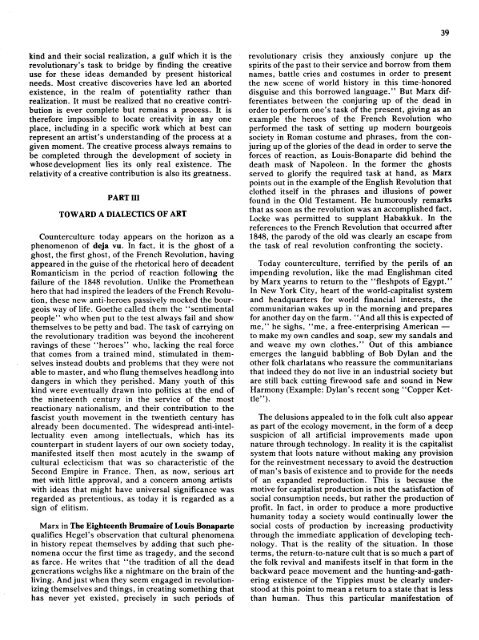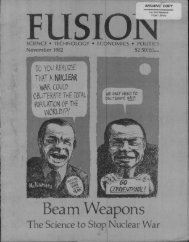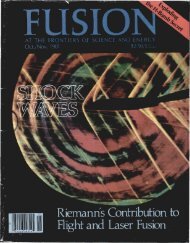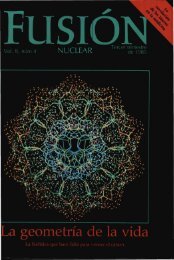New Left, Local Control, and Fascism
New Left, Local Control, and Fascism
New Left, Local Control, and Fascism
Create successful ePaper yourself
Turn your PDF publications into a flip-book with our unique Google optimized e-Paper software.
39<br />
kind <strong>and</strong> their social realization, a gulf which it is the revolutionary crisis they anxiously conjure up the<br />
revolutionary's task to bridge by finding the creative spirits of the past to their service <strong>and</strong> borrow from them<br />
use for these ideas dem<strong>and</strong>ed by present historical names, battle cries <strong>and</strong> costumes in order to present<br />
needs. Most creative discoveries have led an aborted the new scene of world history in this time-honored<br />
existence, in the realm of potentiality rather than disguise <strong>and</strong> this borrowed language." But Marx difrealization.<br />
It must be realized that no creative contri- ferentiates between the conjuring up of the dead in<br />
bution is ever complete but remains a process. It is order to perform one's task of the present, giving as an<br />
therefore impossible to locate creativity in any one example the heroes of the French Revolution who<br />
place, including in a specific work which at best can performed the task of setting up modern bourgeois<br />
represent an artist's underst<strong>and</strong>ing of the process at a society in Roman costume <strong>and</strong> phrases, from the congiven<br />
moment. The creative process always remains to juring up of the glories of the dead in order to serve the<br />
be completed through the development of society in forces of reaction, as Louis-Bonaparte did behind the<br />
whose development lies its only real existence. The death mask of Napoleon. In the former the ghosts<br />
relativity of a creative contribution is also its greatness, served to glorify the required task at h<strong>and</strong>, as Marx<br />
points out in the example of the English Revolution that<br />
clothed itself in the phrases <strong>and</strong> illusions of power<br />
PARTIII found in the Old Testament. He humorously remarks<br />
TOWARD A DIALECTICS OF ART that as soon as the revolution was an accomplished fact,<br />
Locke was permitted to supplant Habakkuk. In the<br />
references to the French Revolution that occurred after<br />
Counterculture today appears on the horizon as a 1848, the parody of the old was clearly an escape from<br />
phenomenon of deja vu. In fact, it is the ghost of a the task of real revolution confronting the society.<br />
ghost, the first ghost, of the French Revolution, having<br />
appeared in the guise of the rhetorical hero of decadent Today counterculture, terrified by the perils of an<br />
Romanticism in the period of reaction following the impending revolution, like the mad Englishman cited<br />
failure of the 1848 revolution. Unlike the Promethean by Marx yearns to return to the "fleshpots of Egypt."<br />
hero that had inspired the leaders of the French Revolu- In <strong>New</strong> York City, heart of the world-capitalist system<br />
tion, these new anti-heroes passively mocked the bour- <strong>and</strong> headquarters for world financial interests, the<br />
geois way of life. Goethe called them the "sentimental communitarian wakes up in the morning <strong>and</strong> prepares<br />
people" who when put to the test always fail <strong>and</strong> show for another day on the farm. "And all this is expected of<br />
themselves to be petty <strong>and</strong> bad. The task of carrying on me," he sighs, "me, a free-enterprising American --<br />
the revolutionary tradition was beyond the incoherent to make my own c<strong>and</strong>les <strong>and</strong> soap, sew my s<strong>and</strong>als <strong>and</strong><br />
ravings of these "heroes" who, lacking the real force <strong>and</strong> weave my own clothes." Out of this ambiance<br />
that comes from a trained mind, stimulated in them- emerges the languid babbling of Bob Dylan <strong>and</strong> the<br />
selves instead doubts <strong>and</strong> problems that they were not other folk charlatans who reassure the communitarians<br />
able to master, <strong>and</strong> who flung themselves headlong into that indeed they do not live in an industrial society but<br />
dangers in which they perished. Many youth of this are still back cutting firewood safe <strong>and</strong> sound in <strong>New</strong><br />
kind were eventually drawn into politics at the end of Harmony (Example: Dylan's recent song "Copper Ketthe<br />
nineteenth century in the service of the most tle").<br />
reactionary nationalism, <strong>and</strong> their contribution to the<br />
fascist youth movement in the twentieth century has The delusions appealed to in the folk cult also appear<br />
already been documented. The widespread anti-intel- as part of the ecology movement, in the form of a deep<br />
lectuality even among intellectuals, which has its suspicion of all artificial improvements made upon<br />
counterpart in student layers of our own society today, nature through technology. In reality it is the capitalist<br />
manifested itself then most acutely in the swamp of system that loots nature without making any provision<br />
cultural eclecticism that was so characteristic of the for the reinvestment necessary to avoid the destruction<br />
Second Empire in France. Then, as now, serious art of man's basis of existence <strong>and</strong> to provide for the needs<br />
met with little approval, <strong>and</strong> a concern among artists of an exp<strong>and</strong>ed reproduction. This is because the<br />
with ideas that might have universal significance was motive for capitalist production is not the satisfaction of<br />
regarded as pretentious, as today it is regarded as a social consumption needs, but rather the production of<br />
sign of elitism, profit. In fact, in order to produce a more productive<br />
humanity today a society would continually lower the<br />
Marx in The Eighteenth Brumaire of Louis Bonaparte social costs of production by increasing productivity<br />
qualifies Hegel's observation that cultural phenomena through the immediate application of developing techin<br />
history repeat themselves by adding that such phe- nology. That is the reality of the situation. In those<br />
nomena occur the first time as tragedy, <strong>and</strong> the second terms, the return-to-nature cult that is so much a part of<br />
as farce. He writes that "the tradition of all the dead the folk revival <strong>and</strong> manifests itself in that form in the<br />
generations weighs like a nightmare on the brain of the backward peace movement <strong>and</strong> the hunting-<strong>and</strong>-gathliving.<br />
And just when they seem engaged in revolution- ering existence of the Yippies must be clearly underizing<br />
themselves <strong>and</strong> things, in creating something that stood at this point to mean a return to a state that is less<br />
has never yet existed, precisely in such periods of than human. Thus this particular manifestation of

















